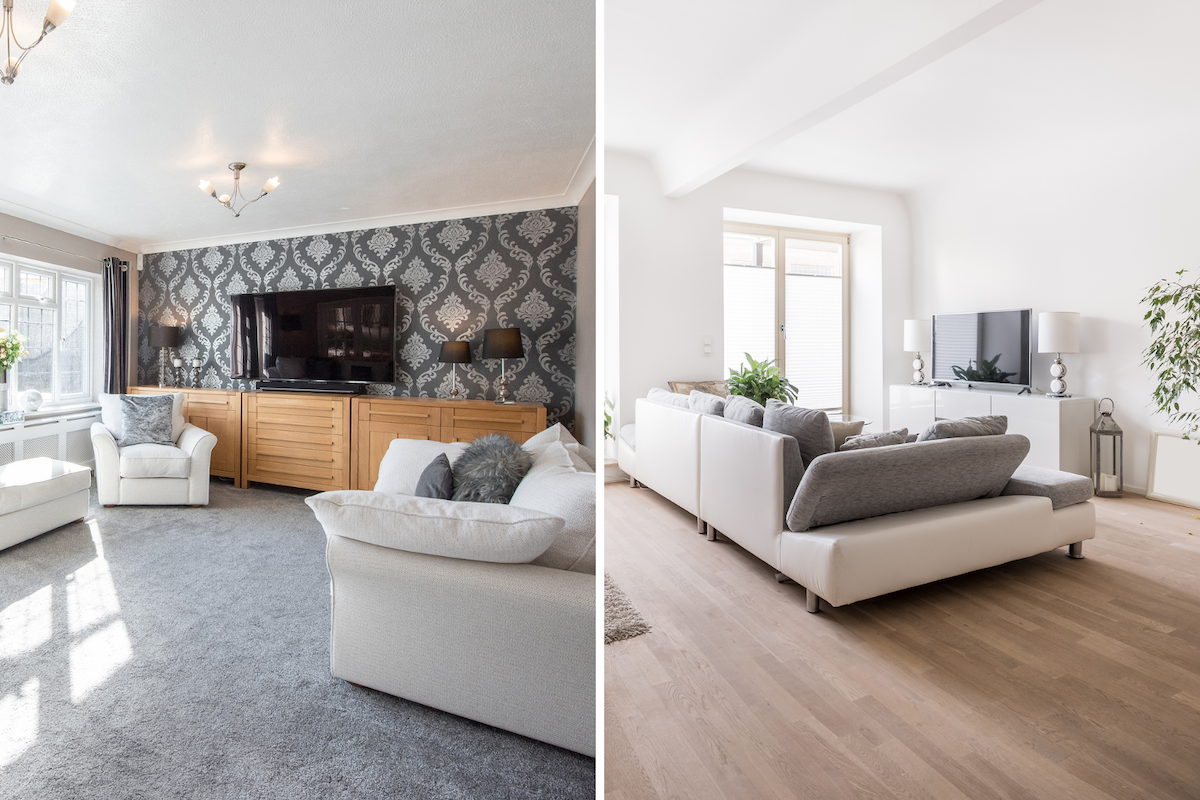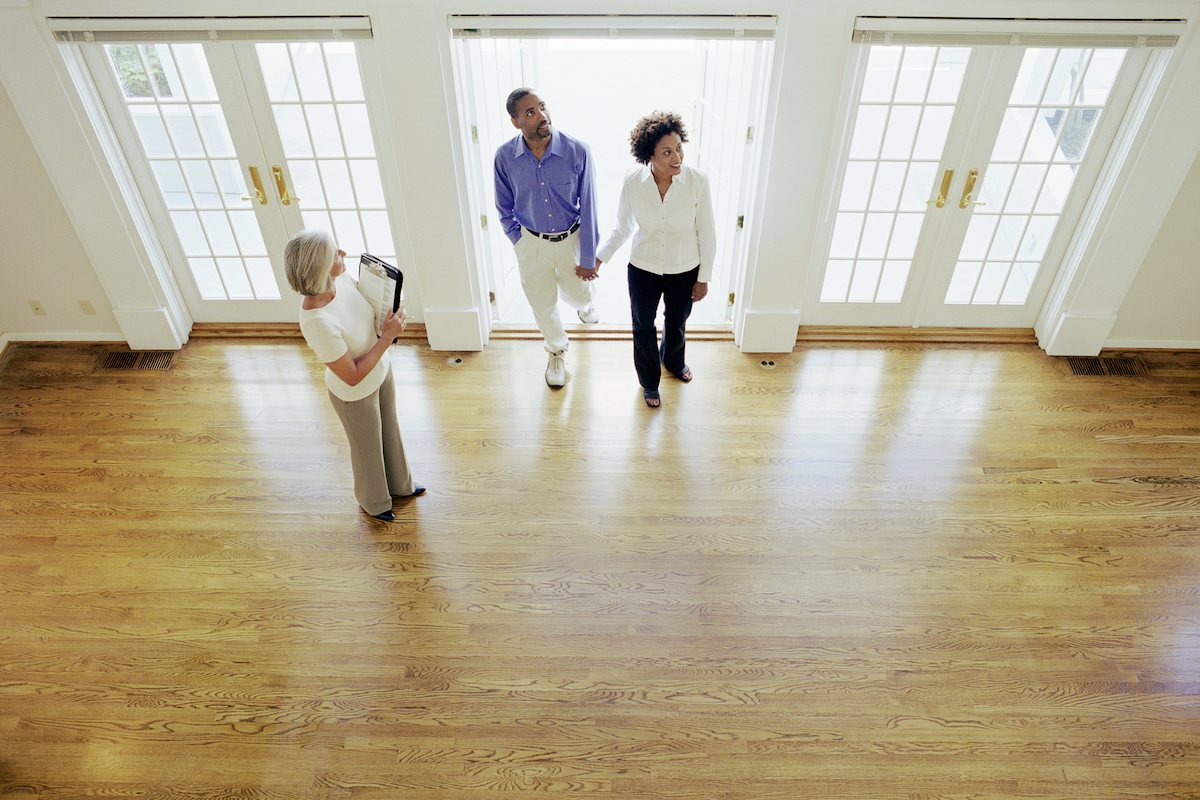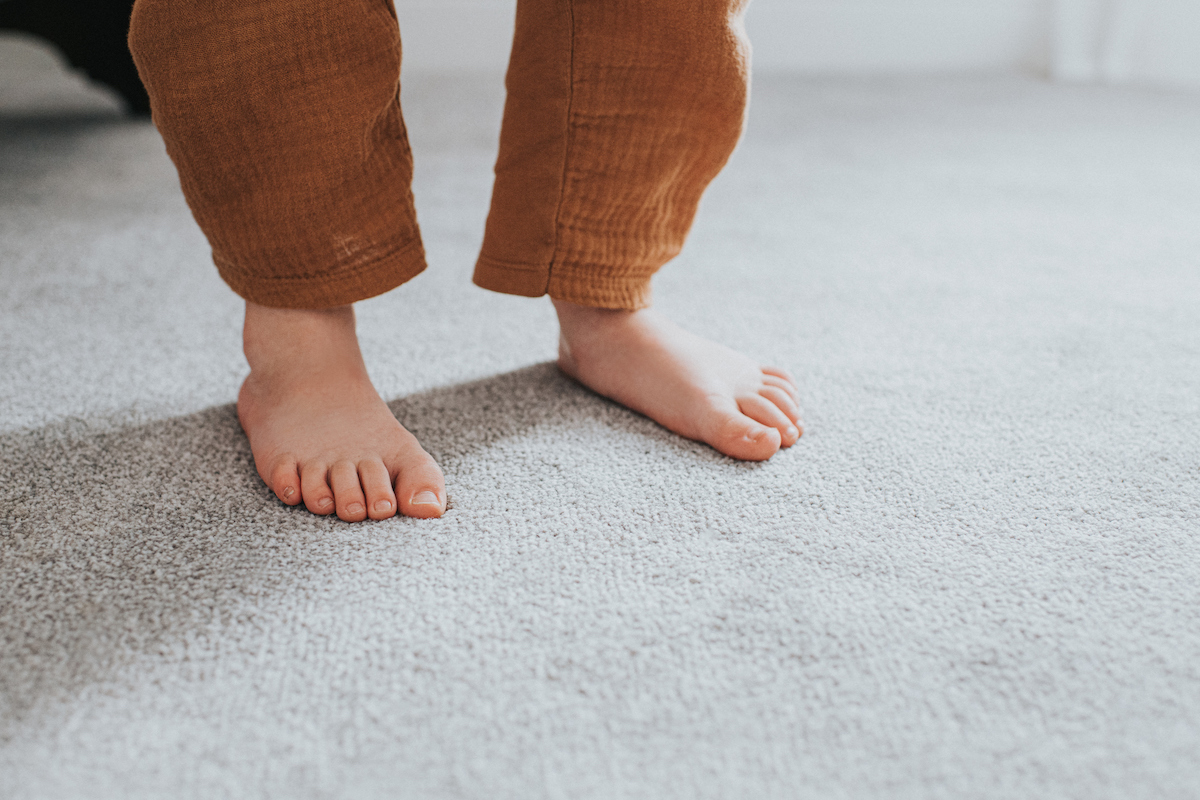

We may earn revenue from the products available on this page and participate in affiliate programs. Learn More ›
When it comes time to update the flooring in the living room, dining room, or bedroom, the debate of hardwood floors vs. carpet is bound to come up because there are significant benefits and drawbacks to both types of flooring. Whether the goal is to renovate the home for the purpose of increasing the resale value or to simply change the features to match personal preference, it’s necessary to consider the appearance, feel, maintenance requirements, and cost of carpet vs. hardwood.
Carpet vs. hardwood is a choice that depends on lifestyle and personal preferences. As a general rule, says Paul Carter, EVP, Strategic Initiatives at Empire Today, carpet is popular “in the ‘private’ areas of the home, like bedrooms” with hardwood a better option for the public, higher-traffic areas of the home. If you take the time to consider the differences between the two flooring options, it should become clear which product factors are more important for your lifestyle and various rooms of your home. This comparison of the key benefits and shortcomings of each style of flooring might help you make the best choice for your next renovation project.
The biggest difference between carpet and hardwood flooring is the look and feel underfoot.
Before considering cost, insulation, or safety factors, note that the main differences between carpet and hardwood boil down to how each feels and looks. Carpet comes in a wide variety of colors and textures for options to suit almost any home. While you might prefer muted tones, you can also choose bold, single-color carpet or opt for a product with blended fibers that are better at hiding dirt and dust.
Carpets with a pattern or mosaic can serve as both flooring and the centerpiece of a room. Carpet is also softer and much more comfortable than hardwood, which is why it’s common to see a bedroom with carpet, while hardwood isn’t as prevalent there.
Hardwood is solid and feels firm underfoot, but its primary appeal is the appearance. You can choose from many different wood tones, colors, and wood-grain patterns to find the hardwood floor that suits your preferences.
Hardwood floors lead to better home resale value.

If the goal of updating the flooring is to increase the resale value of the home, then the choice is clear. Carpet feels great under your feet and it can act as sound and heat insulation, helping to reduce heat loss in the colder months and prevent the transmission of sound through the floor. However, when it comes to resale value, carpet is not the right choice.
Homes with hardwood floors are typically more popular with prospective home buyers and real estate agents. While installing new carpet won’t hurt the appeal of the home, trying to sell a home with old carpet is a more difficult task. Meanwhile, a new hardwood floor improves the appeal of the home and increases the resale value. In fact, on average you can expect a 70 to 80 percent return on investment after installing a new hardwood floor, despite the higher initial hardwood flooring cost.
Carpet vs. Wood Floors: A Comparison
| Hardwood | Carpet | |
| Better for home resale value | ✔ | |
| Costs less to install | ✔ | |
| More durable | ✔ | |
| Good sound-proofing | ✔ | |
| Better for allergies | ✔ | |
| Good for safety | ✔ | |
| Better maneuverability | ✔ | |
| Less likely for water damage | ✔ | |
| Easy to clean | ✔ | ✔ |
Carpet costs less to install than hardwood.

Hardwood looks great and it’s incredibly easy to clean with a broom and a mop, but it has a higher initial cost than carpet. Solid hardwood ranges from $3 to $10 per square foot, depending on factors such as species and configuration. This means that you would spend $432 to $1,440 for the material to put a hardwood floor in a 144-square-foot room.
The price of carpet and the carpet installation cost are both lower than the costs associated with sourcing and installing hardwood. The average cost of well-made, durable carpet will range from $1.50 to $8 per square foot, with that range based on yarn content and basic carpet construction,” says Carter. You would pay about $216 to $1,152 to carpet a 144-square-foot room. Expect to pay between $3 and $11 per square foot ($432 and $1584 for 144 square feet) to have a professional install the carpet in your home. Just keep in mind that while the initial cost of carpet is lower, the resale value hardwood adds is still higher.
Hardwood flooring is more durable and lasts longer than carpeting.
One of the most important factors to consider when deciding between carpet and hardwood is the longevity of the flooring material. In general, both types can have long lives if maintained properly. Carpet is cheaper to buy and install, but if you don’t want to see the backing through the carpet’s fibers as it wears, then you might need to replace this type of flooring every 10 to 20 years.
When hardwood flooring is installed and finished correctly, it is a highly durable option that can surpass carpet in longevity. You will still need to take care of the floor, especially when it comes to cleaning up spills, pet waste, or any other liquid messes, but as long as the home is properly maintained, a hardwood floor can last more than 50 years.
Though the processes are different, both carpet and hardwood are relatively easy to clean.

Whether you are grabbing the broom to sweep up the accumulated dust, hair, and debris from the week or pulling out the vacuum to suction up the dirt and pet hair from the carpet, both methods of cleaning are relatively easy. The difference between the materials occurs when liquids or sticky solids spill on a carpeted floor because these substances seep into the fibers of the carpet, making it incredibly difficult to clean entirely. While the same spill on a hardwood floor will be messy, it usually cleans up quickly with a cloth, towel, or mop.
Cleaning a carpet requires purchase or rental of a carpet-cleaning machine that can steam-clean the fibers while providing powerful suction and physical manipulation to loosen any stuck-on substances. The best way to keep the carpet looking great is to have it deep cleaned at least once a year. Professional carpet cleaning typically ranges from about $123 to $241, depending on the square footage of the area to be cleaned.
Hardwood flooring might be a better option for people who have allergies.
If allergies are a concern for anyone in your home, then carpet flooring isn’t the best choice. This is due to the complex construction of carpet, which can make it very difficult to completely remove dust, dirt, pet hair, dander, or any other allergens that have gotten trapped in the thousands of tightly woven fibers. While vacuuming regularly can help keep the carpet clean, allergens can still become trapped so deep in the carpet fibers that only a deep-cleaning can completely remove these substances.
It’s much easier for allergens like pet hair to become airborne after they have settled on a hardwood floor than if they had dropped onto a carpeted floor. So it’s important to clean the wood floor regularly to prevent dust, dander, and pet hair from spreading throughout the home.
WhisperHOME Engineered Hardwood Flooring
Billed by the company as “the quietest wood flooring in the world,” and just as quiet as carpeted flooring, Empire Today’s WhisperHOME engineered wood flooring looks like any other hardwood flooring. Its proprietary installation method allows for more sound dampening, and thus less noisy foot traffic in the home.
What’s more, WhisperHOME is made in the USA from FSC-certified lumber, contains no VOCs, and has a formaldehyde-free adhesive.

Photo: Empire Today
Carpet offers better sound absorption than hardwood.
Dense carpeting and padding act as sound insulators reducing sound transmission through the floor of the room. Pet owners with carpeted floors and stairs appreciate not having to listen to their pets’ feet click-clacking on hardwood.
If you’re remodeling a home or especially a rental property, be sure to check requirements for sound absorption in local building codes. Select either carpet or hardwood flooring based on those requirements and the decor, but be sure to look for sound absorption qualities of hard surfaces in particular.
Both carpet and hardwood are susceptible to heat and water damage.
It doesn’t matter which type of flooring you are considering if the basis for the choice is whether the floor can hold up against heat or water damage; both carpet and hardwood are vulnerable to burning, rotting, swelling, and mold growth, but typically are relatively heat-resistant. In general, carpet has a lower burning point than wood. This means that carpet would catch on fire before hardwood would ignite, and minor burns would be more serious with a carpeted floor than a hardwood floor.
Water can cause more damage to hardwood than carpet because it can cause the wood to swell, warp, and crack. However, carpet can conceal damage that has been done to the subfloor and structural beams underneath the carpet. Ideally, keep hot objects, as well as water and other liquids, away from both carpet and hardwood to preserve the floor in your home.
Carpet feels warmer underfoot, but radiant floors work better with hardwood.

Dense carpeting is an excellent insulator that helps keep a room nice and toasty during the winter months. So when it comes to hardwood vs. carpet in bedrooms, the choice might be simple for most people because it’s more comfortable to step down onto a soft, warm carpet in the middle of the night than it is to deal with a freezing-cold hardwood floor.
Yet while carpet is more comfortable, hardwood works better with a radiant floor heating system because it conducts the heat better. Carpet insulates the floor, acting as a barrier and slowing the transmission of heat from the heating system. Installing a radiant floor heating system also helps to eliminate the problem of cold hardwood flooring.
